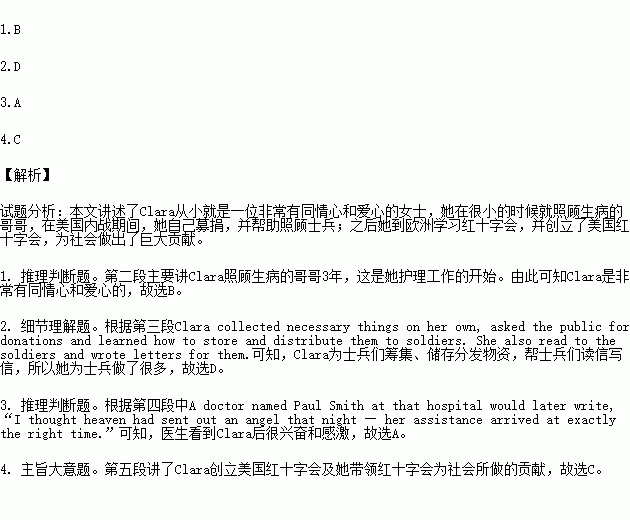题目内容
Clara Barton, born on Christmas in 1821, is widely known as one of the most honored women in American history. She began teaching school when most teachers were men at that time. Later, she became one of the first women ever to be employed by the government.
Her career in helping the sick began when her brother David became her first patient. He fell down from the roof of a house when Clara was just 11 years old. She stayed by his side and looked after him for three years, learning how to give him all his medicines.
When the Civil War began in 1861, she immediately recognized that the poorly equipped soldiers needed help. Instead of waiting for others to step in, Clara collected necessary things on her own, asked the public for donations and learned how to store and distribute them to soldiers. She also read to the soldiers and wrote letters for them.
After the Battle of Cedar Mountain in northern Virginia in 1862, Clara arrived at a field hospital at midnight with a vehicle full of supplies. A doctor named Paul Smith at that hospital would later write, “I thought heaven had sent out an angel that night — her assistance arrived at exactly the right time.”
In 1869, Clara went to Europe and learned about the International Committee of the Red Cross. Upon her return to the United States, she successfully founded the American Red Cross. She led the organization for the next 23 years. Her last field mission (使命) as president of the American Red Cross was to help the victims of the 1900 Galveston hurricane. She did not retire (退休) from the American Red Cross until she was 83. True to her nature, Clara always went to where the need was the greatest.
Today, the American Red Cross continues the mission Clara started more than 100 years ago. With the help of thousands of volunteers, the American Red Cross provides relief to victims of disasters, as well as helps people prevent, prepare for and respond to all sorts of emergencies.
1.We can learn from Paragraph 2 that Clara Barton was _____.
A. honestB. caringC. talentedD. modest
2.After the Civil War broke out, Clara Barton _____.
A. joined the army and fought bravely
B. went to Europe for further study
C. continued to work as a teacher
D. did a lot to help soldiers
3.Seeing Clara Barton’s arrival, Dr. Smith must have felt _____.
A. excited and grateful
B. proud and joyful
C. shy and nervous
D. sad and sorry
4.What is mainly described in Paragraph 5?
A. The aim of the American Red Cross.
B. The importance of voluntary donations.
C. Clara Barton and the American Red Cross.
D. Clara Barton’s contribution to the Civil War.

